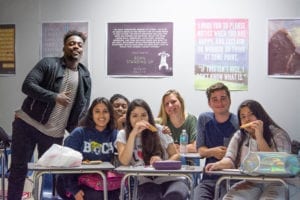 What problem can you identify at your school and what can you do about it?
What problem can you identify at your school and what can you do about it?
It was a simple question but it was the match that lit a national solution to a problem every blog post, book or movie on teenagers addresses: high school lunch.
Not the actual food but the social miasma associated with it.
Who can I eat with?
For students at Boca High, the answer is — With us!
When the founders of We Dine Together — Denis Estimon, Jean Max Meradieu, Kinsley Florestal and Ally Sealy — were challenged at a Propel (People Reaching Out to Provide Education and Leadership) summer leadership conference to work towards solving a problem in their school, they thought of what they saw in their cafeteria every day: students isolated by language, social status, cliques or just the challenge of being new.
Denis explained, “The conference was the same weekend as the Orlando shootings. The headlines were full of that and ISIS. It just felt like the world was spiraling out of control. We started thinking about a club that would bring everyone together. In a society that divides us, we wanted to unite people. We formed We Dine Together and during Club Rush in September we handed out flyers and invited everyone to come to our room on Tuesdays for pizza.”
Getting started
Suddenly students who had no one to talk to had someone — lots of someones. Someones that even spoke the same language. Denis continued, “The club is so diverse. If you come and you speak in Portuguese, there’s another Brazilian there who speaks Portuguese. We have Haitians who speak Creole and people who speak Spanish. You may be new when you walk in, but by the time you leave, you have 80-90 people who will greet you in the hallway.”
“Every meeting has an interactive activity too, like standing in two circles- an inner and an outer one- facing each other. Then we give them thirty seconds to share something about yourself on the topic. We rotate the circle a couple times and you find tons of people who share something in common with you.”
“For a while we didn’t know if we were achieving our mission. We saw that people were taking part in the activities but when we suggested that they meet someone new, a lot of them would just stand around. It was Thanksgiving, and we just started getting text messages, ‘I’m thankful for this club.’ ‘I met my best friend here.’ ‘You’re the first people who have ever come up to me.’”
And the culture shift spread beyond even those in the club. Calista Steffen remembers, “It was scary to transition from being home schooled to going to Boca High as a freshman because I didn’t know what to expect. How do I navigate the hallways, how do I remember my class schedule and even how do I work the padlock on my locker?”
“Club Rush was crazy with everyone packed into the courtyard and all the tables advertising the clubs but then we saw some kids who didn’t wait for people to come to them. They went up to everyone, gave them a flyer and invited them to lunch. They made a point of asking everyone’s name. It made me realize that even in a school of 3,500, people were looking out for each other. If they can make a point of introducing themselves to strangers, why can’t I? You never know when someone might need someone just to be friendly.”
Branching out
This straightforward solution to the problem of surviving high school lunch started to gain media attention when the Sun Sentinel and even the CBS Evening News featured We Dine Together. Denis explained, “We got even more messages when the media started. Someone texted, ‘I ate by myself for three years. Now school is a place I want to come.’”
“We’ve heard from over a hundred and fifty schools around the country and most of them are outside Florida. Youth pastors are reaching out to students in their youth groups to start clubs at their schools. We never promoted this at all, and we care more about students meeting needs than establishing more We Dine Together clubs. For the ones who want to use our model, right now we’re writing a constitution, working on developing an application process and a curriculum, and forming a non-profit.”
Rooted in faith
Pastor Scott Weber of Connected Life Christian Church, a non-denominational church in Boca Raton, explained, “The then director of Propel, Nhu Nguyen, and I shared a vision to help at risk students in our community. We offered to bring Propel, a secular non-profit, into our church building. Several of the students began to identify with our church. In the summer of 2016, the director of Propel, Greg Francis, challenged Denis Estimon to do something that would really make a difference at his school.”
“Denis was the right person for a few reasons. First, he is a visionary. He likes to think of new ideas and big ideas. Second, Denis takes his faith in Jesus seriously. He has often said to me that he wants to ‘make Jesus famous,’ his way of saying he wants to obey the Great Commission. Third, Denis knew what it was like to be isolated and feel like he didn’t fit in. As a first generation Haitian immigrant, he remembers how lonely he felt in the first grade. Finally, Denis had the right friends. Jean Max, Kinsley and Ally were vital to the beginning and the growth of the club.”
 What change do you want to see?
What change do you want to see?
In the fall, three of the club founders are headed to college but they see it as just a new audience for their message. ““We started the club to see change. We wanted to inspire other students around the country to take steps towards solving the problems they see. Two weeks ago we heard from a group of students who want to start an organization to send out educational tablets to foster children.”
“We’re seeing this as a movement. Our website will have a tab that asks ‘What change do you want to make in your community?’ This is about people coming together to solve issues and change the world.”
To connect with Denis, [email protected]
Anitra Parmele is a writer for Calvary Chapel Fort Lauderdale. To contact her, email [email protected].


Comments